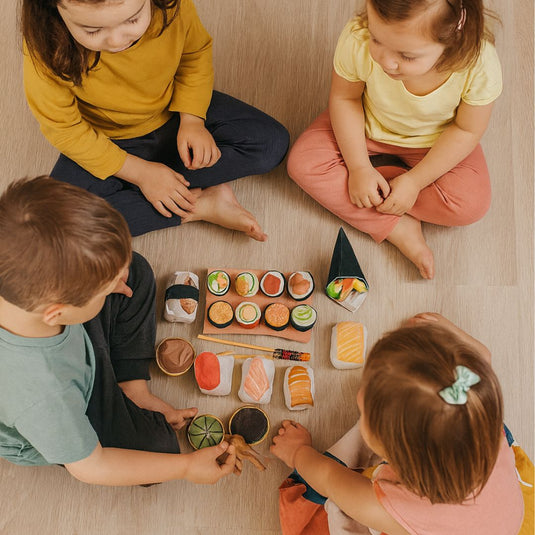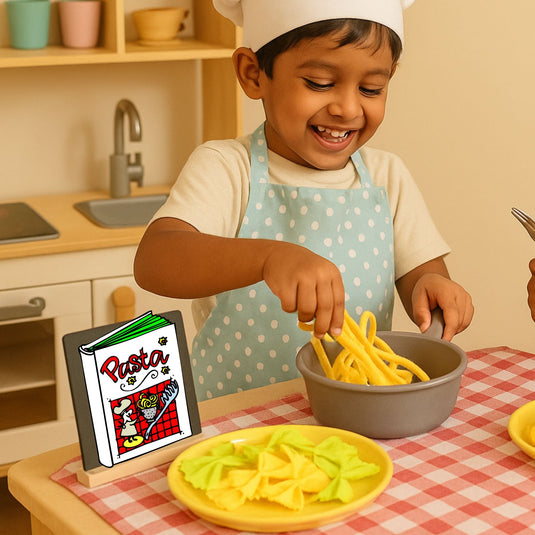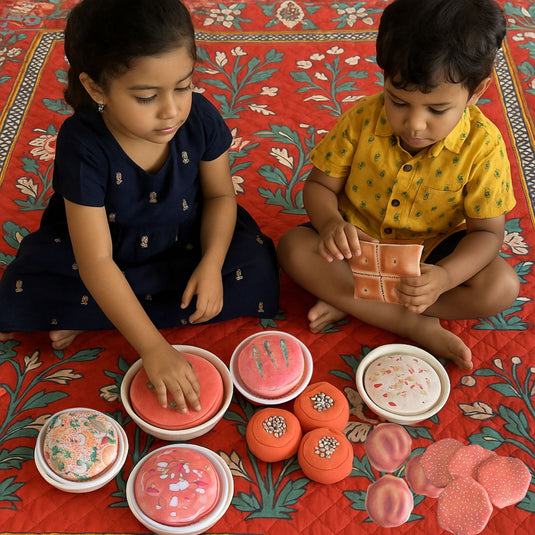As parents, we all want our children to grow up making healthy food choices. But teaching kids about nutrition is not always easy — especially when real food comes with picky eating, tantrums, and a hundred questions!
One simple and playful tool that helps?
👉 Pretend play food toys
At The Small Wonderland, we design Indian-themed pretend-food sets to help children learn through fun, hands-on play. Let’s explore how pretend food can encourage healthy eating habits in children aged 2–10.
1. Introduces Children to Real-Life Foods
Children learn best through what they see around them. Pretend play sets that include familiar foods like roti, dal, idli, dosa, sabzi, rice, fruits, and veggies help children recognise everyday meals and include them in play.
This strengthens:
✔ Food recognition
✔ Familiarity with new foods
✔ Reduced picky eating
Our Indian Pretend Fruit Set & Dosa Set are perfect for helping kids identify and accept real foods they see daily.
2. Builds Positive Relationship With Food
Children create happy memories around pretend cooking — serving dosa to mom, making a fruit plate for papa, or hosting a thali party.
These fun experiences make real food feel friendly and exciting.
Instead of “I don’t like bhindi,” kids start seeing it as something they can play with and “cook,” which reduces resistance toward eating vegetables.
3. Encourages Children to Try New Foods
Pretend play is safe — there’s no pressure to taste, just explore.
When kids get familiar with different foods while playing, they feel more open to trying them during meals.
Example:
Kids who play with fruits like guava, papaya, or pomegranate pretend toys often show curiosity to try them in real life.
4. Sparks Conversation — Natural Nutrition Learning
Pretend play opens space for simple food conversations:
🗣 “Fruit gives us energy!”
🗣 “Dal makes us strong!”
🗣 “Eating veggies helps our eyes!”
These simple messages make nutrition fun and relatable — and they come naturally while your child plays.
5. Teaches Healthy Plate Balance
With pretend fruits, veggies, grains, and proteins, children learn about balanced meals.
They start understanding:
🍎 Fruits & vegetables
🥣 Grains
🥛 Milk products
🥜 Protein
Building a pretend thali teaches that variety is important.
The Small Wonderland’s Punjabi Thali & BHARAT-themed sets help kids create nutritious “full plates” in pretend play.
6. Develops Life Skills
Healthy eating is not just about what kids eat — but also how they think about food.
Pretend play promotes:
✔ Vocabulary — names of ingredients
✔ Cooking steps — chop, mix, serve
✔ Meal planning — who eats what?
✔ Table manners — serving & sharing
These early experiences build confidence and independence.
7. Helps Kids Reduce Screen Time
Food play keeps kids busy doing real-world skill-based activities — not just watching screens.
Children spend time thinking, talking, and creating healthy “meals,” which strengthens brain development.
Why Choose The Small Wonderland Pretend-Food Toys?
Because we make toys that combine:
✨ Education
✨ Culture
✨ Fun
✔ Inspired by real Indian meals
✔ Soft & safe fabric
✔ No sharp edges
✔ Durable & washable
✔ Perfect for kids ages 2–10
✔ Encourages positive food experiences
Whether it’s dosa, idli, dal-chawal, fruits, sandwiches, or a full thali — kids instantly connect with what they see at home.
YES — pretend play food can absolutely help teach healthy eating habits to children.
It:
🌱 Builds familiarity
🍎 Encourages curiosity
🥗 Supports nutrition conversations
🧠 Strengthens real-life food understanding
🍱 Makes trying new foods fun
If you want to gently guide your child toward healthy eating, pretend play is one of the simplest & most enjoyable parenting tools.
Explore our beautifully crafted Indian pretend food collections at The Small Wonderland — where learning tastes like fun!
👉 Shop Now — The Small Wonderland




